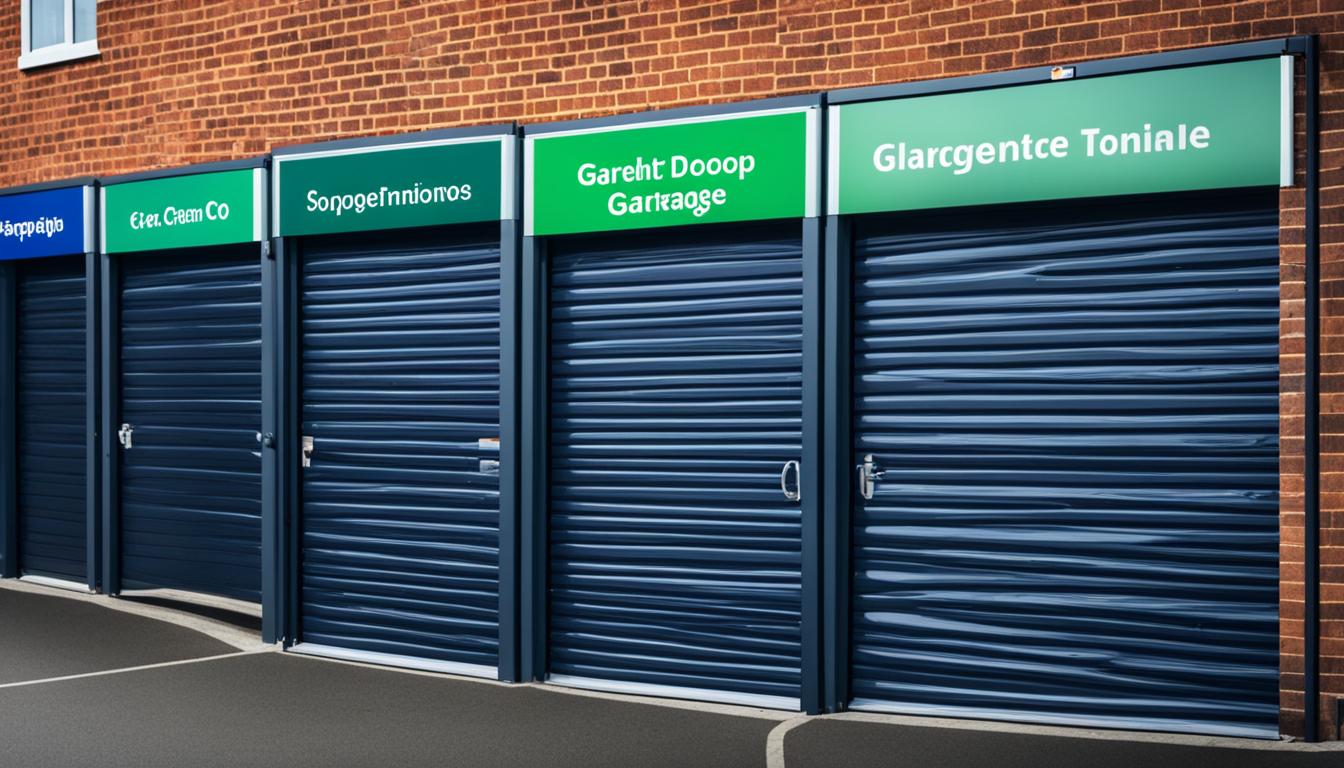Are you interested in starting your own garage door business? With the rising demand for garage door repairs and installations, now is the perfect time to embark on this entrepreneurial journey.
Whether you have experience in the industry or are just starting out, this article will provide you with the essential steps to kickstart your garage door business and achieve long-term success.
Key Takeaways:
- Starting a garage door business can be highly lucrative, given the average frequency of garage door functions and repairs.
- Creating a comprehensive business plan, including detailed market research, growth goals, and strategies, is crucial for success.
- Establishing a strong brand identity through memorable names, logos, and consistent visual elements will help attract customers.
- Hiring qualified employees with construction knowledge and skills is essential for delivering quality services.
- Calculating expenses, creating a budget, and ensuring proper financial management are vital for the sustainability of your business.
Create a Detailed Garage Door Business Plan
A successful garage door business starts with a well-crafted business plan. This crucial document lays the foundation for your venture, guiding your decisions and ensuring long-term success.
To create a detailed garage door business plan, follow these essential steps on how to start a garage door business:
1. Research the Industry and Competitors
- Gain a comprehensive understanding of the garage door industry, including market trends, customer preferences, and emerging technologies.
- Analyze your competitors’ strengths, weaknesses, and pricing strategies to identify areas where you can differentiate and excel.
2. Seek Advice from Established Business Owners
Connect with experienced garage door repair business owners to gain valuable insights and advice. Their guidance can help you avoid common pitfalls and navigate the industry more efficiently.
3. Understand the Local Competition
- Evaluate the garage door businesses operating in your area to determine the level of competition.
- Identify gaps in the market that you can fill or niche markets that you can target to carve out your own unique position.
4. Outline Your Services and Offerings
Define the range of services your garage door business will provide, such as installation, repair, maintenance, and replacement. Clearly articulate the value proposition and competitive advantage of your offerings.
5. Set Growth Goals
- Establish specific and measurable goals for your garage door business, such as revenue targets, market share growth, and customer acquisition.
- Break down these goals into actionable steps and timelines to track your progress and stay on track.
6. Develop Strategies for Success
- Create a roadmap of strategies that will help you achieve your goals, such as effective marketing campaigns, superior customer service, and quality control measures.
- Consider factors like pricing, customer acquisition channels, partnerships, and innovative solutions to differentiate your business from competitors.
Creating a detailed garage door business plan is an essential step in starting a successful venture. It sets the trajectory for your business, providing a solid framework to guide your decisions and actions. With a well-crafted plan in place, you’ll be better equipped to navigate the challenges of the industry and achieve your growth goals.
Establish Your Brand and Identity
Developing a strong brand is essential for your garage door business. It sets you apart from the competition and helps attract and retain customers. To establish a successful brand identity, follow these steps:
- Choose a Memorable Name: Select a name that is easy to remember and reflects the essence of your business. Consider incorporating keywords related to garage doors to improve search engine visibility.
- Design a Memorable Logo: Create a visually appealing logo that resonates with your target audience. Make sure it is professional, modern, and represents the reliability and expertise of your garage door business. Your logo will be the face of your brand, so invest time in creating a design that stands out.
- Maintain Consistency: Consistency is key in establishing your brand identity. Use the same colors, fonts, and visuals across all platforms, including your website, social media profiles, signage, and advertising materials. This creates a cohesive and recognizable brand experience for your customers.
- Showcase Professionalism and Reliability: Position your brand as a trusted expert in the garage door industry. Emphasize your commitment to offering high-quality products and exceptional customer service. Use testimonials and case studies to demonstrate your expertise and build trust with potential customers.

By establishing a strong brand and identity, you’ll create a lasting impression in the minds of your customers and differentiate your garage door business from competitors.
Identify Skillset and Hire Qualified Employees
Hiring qualified employees is essential for the success of your garage door business. When searching for the right candidates, it is crucial to focus on individuals with a background in construction. Look for employees who have experience in both garage door repair and installation tasks to ensure versatility within your team.
Garage door technicians should have a deep understanding of various garage door systems, including modern smart garage doors. This knowledge will enable them to effectively handle different types of repairs and installations, providing top-notch service to your customers.
During the hiring process, consider conducting thorough interviews to assess candidates’ technical skills, problem-solving abilities, and customer service aptitude. Request references or seek recommendations from trusted sources in the industry to ensure you hire employees who are reliable and proficient in their roles.
Remember, your garage door technicians will be the face of your business, interacting directly with customers. Investing in qualified employees will not only ensure high-quality service delivery but also help build a positive reputation and customer loyalty for your garage door business.
- Look for candidates with a background in construction
- Prioritize individuals with experience in both repair and installation tasks
- Ensure employees have knowledge of various garage door systems
- Conduct thorough interviews to assess technical skills and problem-solving abilities
- Seek references or recommendations from trusted sources in the industry
Calculate Expenses and Create a Budget
Proper budgeting is vital for your garage door business. When starting out, it’s important to consider both one-time expenses and recurring costs. This will help you effectively allocate your resources and manage your finances. Let’s take a closer look at the key expenses you need to consider.
One-Time Expenses:
- Tools and Equipment: As a garage door business, you’ll need various tools and equipment to handle repairs and installations. This includes wrenches, screwdrivers, drills, and more.
- Transportation: You’ll also need a reliable vehicle to transport your tools and travel to customer locations. Consider the cost of purchasing or leasing a suitable vehicle.
Recurring Expenses:
- Insurance: Protecting your business with comprehensive insurance coverage is essential. This includes general liability insurance, workers’ compensation insurance, and vehicle insurance.
- Marketing: Allocating a budget for marketing activities such as online advertising, local directory listings, and print materials will help attract new customers.
- Wages: If you plan to hire employees, consider the ongoing cost of wages and benefits.
It’s important to note that these expenses are not exhaustive and may vary based on factors such as location and the size of your operation. Be sure to research local market conditions and consult with industry professionals to get a more accurate estimate of your specific expenses.
By carefully calculating your expenses and creating a budget, you’ll be better equipped to manage your finances and ensure the long-term financial success of your garage door business.
Determine Target Audience and Ideal Market
When starting a garage door business, it is vital to determine your target audience and understand the ideal market for your services. In the garage door industry, your primary target audience consists of residential homeowners in need of repairs or installations.
To effectively reach and appeal to this audience, you need to conduct a thorough analysis of the local market and understand the competition. Consider factors such as the demographics of the area, the number of homes with garage doors, and the level of demand for garage door services.
By gathering data and conducting market research, you can identify trends, preferences, and pain points of your target audience. This information will help you tailor your marketing strategy and develop services that meet the specific needs of your customers.
Understanding the Local Market
- Research the number of homes with a garage in your area to gauge the potential demand for your services.
- Identify the demographics of your target audience, including their age, income level, and housing tenure.
- Study the buying behaviors and preferences of homeowners in your local market.
- Analyze the competition by assessing the number of existing garage door businesses in your area and their offerings.
- Consider the geographical factors, such as climate and neighborhood characteristics, that may impact garage door needs.
By understanding the local market, you can position your garage door business effectively, differentiate yourself from competitors, and tailor your marketing messages to resonate with your target audience.
Develop a Comprehensive Marketing Strategy
A well-rounded marketing strategy is essential for attracting customers to your garage door business. By implementing effective marketing techniques, you can increase visibility, reach your target audience, and ultimately boost sales. When developing your marketing strategy, consider the following aspects:
1. Utilize Search Engine Optimization (SEO)
Implement SEO techniques to improve your website’s visibility on search engines. Optimize your web content by using relevant keywords, meta tags, and engaging meta descriptions. This will help potential customers find your business when searching for garage door services online.
2. Leverage Social Media
Harness the power of social media platforms to connect with your target audience. Create engaging content, share industry insights, and provide helpful tips related to garage door maintenance and repair. Engage with your followers, respond to comments, and build a strong online presence.
3. High-Quality Photos and Visual Content
Use high-quality photos and visual content to showcase your work and engage potential customers. Display before and after images of garage door installations or repairs to demonstrate your expertise and build trust. Incorporate visually appealing graphics and videos in your marketing materials to capture attention.
4. Content Marketing
Create valuable and informative content that educates your audience about garage door maintenance, safety, and the benefits of professional repairs. This can include blog posts, articles, and video tutorials. Establish yourself as a reliable source of information in the industry, which will attract and retain customers.

5. Online Advertising
Utilize online advertising platforms, such as Google Ads or social media ads, to promote your services. Target specific demographics and geographical areas to ensure your ads reach the right audience. Measure the performance of your ads and make adjustments as needed to optimize results.
6. Building Partnerships
Establish partnerships with local contractors, builders, and real estate agents. Offer referral programs or collaborations to expand your reach and tap into a wider client base. These partnerships can generate valuable leads and result in long-term business relationships.
By implementing a comprehensive marketing strategy that incorporates SEO, social media, engaging visual content, content marketing, online advertising, and building strategic partnerships, you can attract more customers and grow your garage door business.
Set Up Operations and Ensure Legal Compliance
Starting a garage door business involves more than just providing repair and installation services. It’s essential to establish proper operations and ensure legal compliance to build a successful and reputable company in the industry. This section will guide you through the necessary steps to set up your operations and meet all the legal requirements for your garage door business.
Registering for Taxes
One of the first tasks you need to address when setting up your garage door business is registering for taxes. Depending on your location, you may need to obtain a federal employer identification number (EIN) from the IRS. This number will be used to identify your business entity for tax purposes.
Obtaining Permits and Licenses
Next, it’s crucial to determine and obtain any necessary permits and licenses for your garage door business. Check with your local government authorities to identify the specific permits and licenses required in your area. This may include general business licenses, home occupation permits (if you operate from a home office), and specialty licenses for construction or contracting work.
Insurance Coverage
Having the right insurance coverage is vital to safeguard your garage door business against potential risks and liabilities. Consider obtaining general liability insurance to protect your business from property damage or injury claims. Additionally, explore options for worker’s compensation insurance, which covers medical expenses and lost wages for employees in the event of an accident or work-related injury.
Following Safety Regulations
When operating a garage door business, prioritizing safety is paramount. Ensure that your operations comply with all applicable safety regulations and codes. This includes providing appropriate safety equipment and training for your employees, implementing safe work practices, and performing regular maintenance checks on tools and equipment.
Creating a Safe Workplace Environment
Creating a safe workplace environment extends beyond adhering to safety regulations. Implementing policies and procedures that promote a culture of safety is essential. Regularly assess potential hazards, establish safety protocols, and provide ongoing safety training for your employees. By prioritizing workplace safety, you can minimize accidents and ensure the well-being of your team.
By setting up your garage door business operations and ensuring legal compliance, you are laying the foundation for long-term success and growth. Registering for taxes, obtaining the necessary permits and licenses, securing proper insurance coverage, and prioritizing safety will establish your business as a reputable and reliable service provider in the industry.
Utilize Software for Efficient Management
In order to streamline and organize the operations of your garage door business, it is highly recommended to utilize management software. This software is specifically designed to handle various tasks, saving you time and ensuring efficiency in your day-to-day operations.
- Employee Scheduling: With the help of management software, you can easily schedule your employees’ shifts and assignments. This ensures that you have the right people in the right place at the right time, optimizing productivity and customer service.
- Budget Tracking: Managing finances is crucial for the success of any business. Garage door business software allows you to track your expenses, income, and overall budget. This helps you make informed decisions and stay on top of your financial goals.
- Sales Recording: Software can also assist in recording and analyzing sales data. You can keep track of customer orders, invoicing, and payment records, allowing you to identify trends and make data-driven decisions to boost sales.
- Inventory Management: Effective management of inventory is essential to ensure you always have the necessary garage door parts and products in stock. Software can help you track inventory levels, automate reorder points, and manage supplier relationships.
By utilizing management software, you can streamline your garage door business operations, improve productivity, and enhance customer satisfaction. With all these benefits, it’s clear that implementing software is a must for efficient management in your garage door company.
Maximize Profits and Long-Term Success
In order to maximize profits and achieve long-term success in your garage door business, it is essential to implement effective strategies and provide quality services. By offering additional services such as maintenance and repairs on existing garage door systems, you can increase your revenue streams and attract repeat customers.
Building strong customer relationships is another key factor in increasing your profits. By prioritizing excellent customer service and ensuring customer satisfaction, you will not only retain existing customers but also generate positive word-of-mouth referrals, which can lead to new business opportunities.
Continuously evaluating and adapting your business strategies is crucial in staying competitive in the dynamic garage door industry. Stay up to date with the latest trends and technologies, and be open to exploring new business opportunities and partnerships that can help you expand your services and reach a larger market.
Remember, profitability in the garage door business is not only about generating sales but also managing your expenses effectively. Regularly review and analyze your financials to identify areas where you can cut costs and optimize your operations.
Utilizing management software can also contribute to increasing your profits by streamlining your business processes, improving efficiency, and reducing manual errors. These software solutions can help you with various tasks such as employee scheduling, budget tracking, sales recording, and inventory management.
Lastly, always keep an eye on industry trends and customer demands, as they can change over time. Stay proactive and adapt your offerings to meet the evolving needs of your target audience. By staying ahead of the curve, you can position your garage door business for long-term success and increased profitability.
Key Points:
- Offer maintenance and repair services to maximize revenue
- Focus on building strong customer relationships and providing excellent service
- Continuously evaluate and adapt your business strategies to stay competitive
- Manage your expenses effectively to optimize profitability
- Utilize management software to streamline operations and reduce errors
- Stay proactive in identifying industry trends and meeting customer demands
Conclusion
Starting a garage door business presents a lucrative opportunity in the growing industry of garage door repair and installation services. By following the essential steps outlined in this article, you can enter the market and capitalize on the demand for these services.
With careful planning and a well-defined business plan, you can lay a strong foundation for your garage door business. Establishing a memorable brand identity and hiring qualified employees with the necessary skills will ensure your business stands out in the competitive market.
Calculating expenses and creating a budget will enable you to manage your finances effectively and allocate resources efficiently. By identifying your target audience and developing a comprehensive marketing strategy, you can attract customers and build a strong customer base.
To ensure long-term success, it is important to set up operations, comply with legal requirements, and create a safe workplace environment. Additionally, utilizing software to streamline management tasks can save time and increase efficiency.
With dedication, excellent customer service, and a focus on additional services, such as maintenance and repairs, you can maximize profits and achieve long-term success in your garage door business. Now, embark on your entrepreneurial journey and make your mark in this thriving industry.
FAQ
What are the essential steps to starting a successful garage door business?
The essential steps to starting a successful garage door business include creating a detailed business plan, establishing your brand and identity, hiring qualified employees, calculating expenses and creating a budget, determining your target audience and ideal market, developing a comprehensive marketing strategy, setting up operations and ensuring legal compliance, utilizing software for efficient management, and maximizing profits and long-term success.
Why is creating a detailed garage door business plan important?
Creating a detailed garage door business plan is important because it helps you research the industry and competitors, set growth goals, and outline strategies for success. It also helps you understand the services you will offer and the resources you will need to achieve your goals.
How do I establish my brand and identity as a garage door business?
To establish your brand and identity as a garage door business, choose a memorable name, design a logo, and maintain consistency in colors and visuals across all platforms. Your brand should reflect professionalism and reliability to attract customers.
What kind of employees should I hire for my garage door business?
It is crucial to hire qualified employees with a background in construction for your garage door business. Look for individuals who can handle both repair and installation tasks and have knowledge of various garage door systems, including modern smart garage doors.
How do I calculate expenses and create a budget for my garage door business?
To calculate expenses and create a budget for your garage door business, consider one-time expenses such as tools and transportation, as well as recurring expenses like insurance, marketing, and wages. The startup cost for a garage door business is approximately ,500.
Who is the target audience for a garage door business?
The target audience for a garage door business primarily consists of residential homeowners in need of repairs or installations. It is important to understand the local market and competition to develop a marketing strategy that appeals to this target audience.
How do I develop a comprehensive marketing strategy for my garage door business?
To develop a comprehensive marketing strategy for your garage door business, utilize search engine optimization (SEO) techniques and social media marketing to increase visibility. High-quality photos and engaging content are key to successful marketing campaigns.
What legal requirements should I comply with for my garage door business?
To set up operations and ensure legal compliance for your garage door business, register for taxes, obtain necessary permits and licenses, and get the required insurance coverage. It is important to follow safety regulations and create a safe workplace environment.
How can I utilize software to efficiently manage my garage door business?
Utilizing management software is highly recommended for organizing and streamlining operations in your garage door business. Software can handle tasks such as employee scheduling, budget tracking, sales recording, and inventory management, saving time and ensuring efficiency.
How can I maximize profits and achieve long-term success in my garage door business?
To maximize profits in your garage door business, consider offering additional services such as maintenance and repairs on existing systems. Focus on building strong customer relationships and providing excellent customer service. Continuously evaluate and adapt your business strategies to stay competitive and achieve long-term success.




